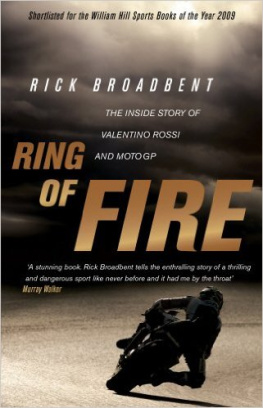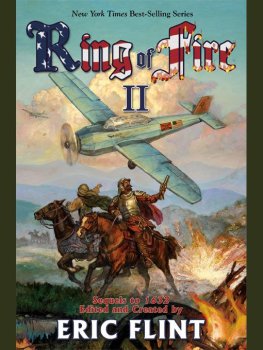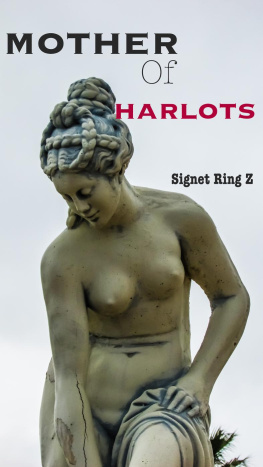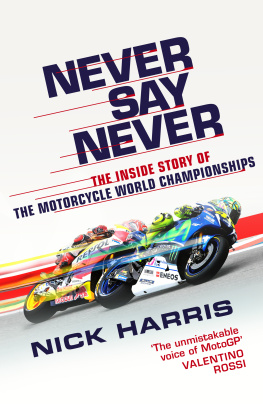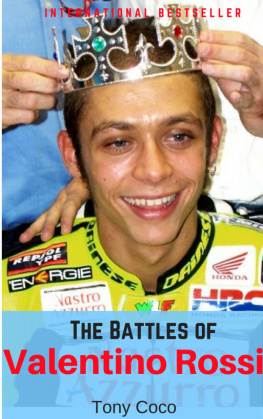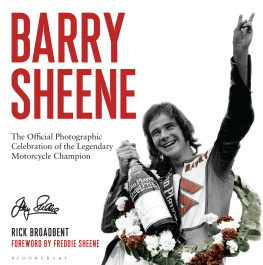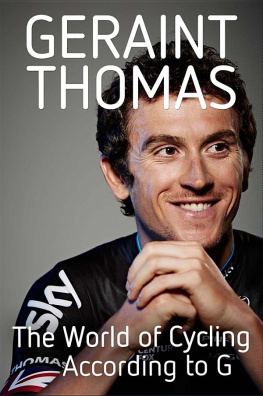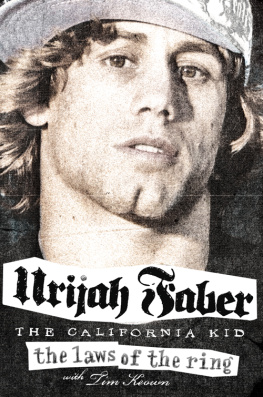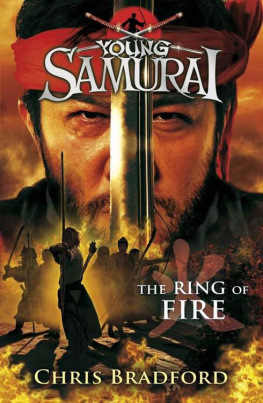About the Author
Rick Broadbent is a sports writer for The Times, for whom he covers MotoGP, among other things. He has previously written books on football, boxing and athletics as well as, most recently, collaborating with motorcycle legend Ron Haslam on his autobiography, Rocket Men, also published by Bantam Books.
www.randomhouse.co.uk
About the Book
In Ring of Fire, the first book to cover the whole of the MotoGP era, Rick Broadbent gives a breathless behind-the-scenes account of the acclaim, heroism, pressures and danger of life at 200mph. At its centre is Valentino Rossi. Brilliant, eccentric, brave and above all fast, the Italian megastar has left motorcycling records trailing in his wake.
Ring of Fire also looks back at the sports tradition of romance, reprobates and debauchery, interweaving the story of Rossis hero, Mike Hailwood, a legend who launched a mesmerizing comeback of his own. By turns funny, sad, shocking and uplifting, it brings us face to face with the extraordinary cast of characters that make up this white-knuckle sport. This is the fast lane and they all dance in a ring of fire.
Acknowledgements
Over the years I have been grateful for the knowledge, kindness and enthusiasm of numerous people in motorcycling, including Nick Harris, Iain Mackay, Matthew Roberts, Gavin Emmett, Chris Herring, Ali Forth, Katie Baines, Neil Bramwell, Carl Fogarty, Chaz Davies, James Toseland, Neil Hodgson, Roger Burnett, Dr Martin Raines, Barry and Angela Coleman, Ron, Ann and Leon Haslam, Julian Ryder, Mat Oxley, Matt Birt, Mike Scott, Dave Fern, Toby Moody, Steve Westlake and David Dew.
From another era I am heavily indebted to Pauline Hailwood, Giacomo Agostini, Tommy Robb, Ralph Bryans, Paddy Driver, Bo Granath, Ted Macauley and John Cooper.
Many books and newspapers were referred to, but Mike the Bike by Christopher Hilton and Ted Macauleys Hailwood and Mike the Bike Again were particularly useful. Thanks to Silvia Nucini, Monty Shadow, Mark Hughes and to Vanity Fair Italy, Laureus and Haynes Publishing for their help. Thanks too to Giles Elliott at Transworld and David Luxton at Luxton Harris for getting the idea off the ground.
Finally, I would especially like to thank Valentino Rossi and Max Biaggi, whose rivalry was as good as sporting theatre gets, and Debs, Sam and Erin for letting me live with them.
Also by Rick Broadbent
Looking for Eric: In Search of the Leeds Greats
Seize the Day (with Dame Tanni Grey-Thompson)
The Big If: The Life and Death of Johnny Owen
Rocket Men (with Ron Haslam)
CHAPTER ONE
ESTORIL, 2006
IT IS THE unusual that makes sport such an addictive drug. For months and years you watch unspectacular events that soon become forgotten little histories, but you always hope. The sports fan is an archaeologist digging through dust and ruins for naked drama, and the enduring thrill is you never know when you are going to strike it rich.
So as I talk to Iain Mackay in the paddock at Estoril in Portugal, an ugly racetrack prone to showers blowing in off the Atlantic, we cannot know that we are about to witness a sequence of events that people will never forget.
Mack is a die-hard Celtic fan who lives in Amsterdam and works in Hondas press department. A font of all knowledge, he speaks in conspiratorial tones, the words barely making it out from beneath his grey moustache. He thinks Nicky Hayden will win. If I didnt I wouldnt be here, would I? he laughs.
But Hayden and Honda are up against it. Just a few races ago, when he won on home soil in the United States, he held a commanding fifty-one-point lead over Valentino Rossi.
But then his RC211V was hit by the clutch problem that has sabotaged his starts and led to this dramatic denouement. Rossi, the charismatic seven-time world champion, has whittled the lead down to a fragmentary twelve points with only two races to go. He has been making confident noises in the build-up to the Portuguese Grand Prix too, praising his Yamaha team and telling everyone that he feels great.
Hayden is less convincing. In his last four races he has finished ninth, fourth and fifth twice and, despite Macks softly spoken confidence, the consensus is Hayden is limping towards the line in need of both a tourniquet and a corner turned. Its the biggest race of my life, Hayden says in his Kentucky brogue, the look he gives the pressmen as pointed as his designer sideburns.
Earl Hayden is nervous too. In the old days, back on the farm, when the summers were baking the land and threatening their very existence, he would take his sons Nicky, Tommy and Roger Lee out into the fields and they would raise their hands to the heavens and rub their fingers. Pray for rain, boys, he would say. Pray for rain.
Earlier this season, Earl had done the same thing in Australia when Nickys clutch problem had seen him drop from first to eighteenth on the very first lap. They needed something to soften the blow and so he went out into the pitlane, raised his hands and rubbed his fingers. The rain came and washed away some of the pain. Nicky recovered to fifth as the conditions worked to his advantage. Now Earl was watching by the wall again, his lucky No. 69 ring on a crossed finger.
Rossi v. Hayden, Honda v. Yamaha, this afternoon v. Earls pained nerves. It was the crunch, the moment Earl had waited for and the one he had dreaded. This paddock, with its zipping scooters weaving in and out of punters on behind-the-scenes tours, its gargantuan trucks and lackeys washing dismembered parts, its brolly dollies and their PVC hot pants, was free to enjoy the pressure. But not Earl. This was a million miles away from Second Chance Autos and his days spent stripping tobacco. Earl could barely think that, within an hour, his son might be the 2006 MotoGP world champion.
Basi Pedrosa was just as anxious. Her son, Dani, had already had a successful debut year in MotoGP. A world champion at 125cc and 250cc level, Pedrosa had long been billed as the new Rossi. Pedrosa had just turned twenty-one and was Hondas blue-eyed boy, a remorselessly pragmatic Spaniard who punished himself every morning with 800 sit-ups. His time was coming and, although it would take a major turnaround, he still had a mathematical chance of winning the title. That was one reason why Honda said there would be no team orders. Team-mates they might be, but Hayden and Pedrosa had been told to race hard. Satoru Horiike, the managing director of the mighty Honda Racing Corporation, had almost bristled with indignation when the subject of a team plan had been raised. Basi just hoped things would work out for her son. The next hour would suggest she did not hope hard enough.
At 1.50 p.m., with the clouds thickening overhead, Rossi crouched down by his bike. It was a beautiful combination of cutting-edge technology and aesthetic craftsmanship. The YZR-M1 had been revolutionized by Rossi. When he walked out on Honda in 2003 to join Yamaha, they had been a struggling factory, devoid of inspiration and even the inclination to usurp Honda. But by the sheer force of Rossis will and the motivation of paying him 6 million, they had become the best almost instantly. When Rossi had won his first race for Yamaha in a redneck South African afterthought called Welkom, he dismounted and kissed his bike. He called it her and would often creep out of his motorhome late at night, wander through the deserted paddock and slip into the garage to see her. Sometimes they would even sleep together.
The cameras clicked in his face but Rossi was in his zone. This was all part of a time-honoured routine. Nobody could get to Rossi when he was on the track. It was his release from the life that meant he called himself a creature of the night. He said everything was more peaceful at night, softer and slower, like a parallel universe. But now it was early afternoon in Estoril and his world title was hanging by a thread. So he thought of winning. Only of winning. Faster, harder, better than Hayden.

